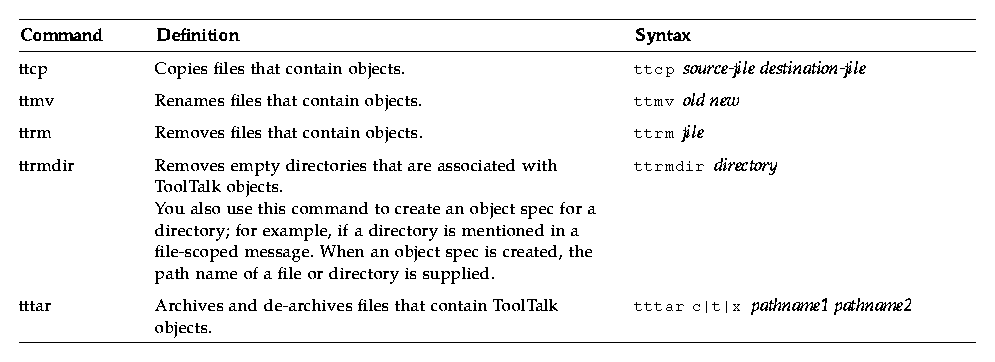




ToolTalk User's Guide
6 Maintaining Files and Objects Referenced in ToolTalk Messages
Contents of Chapter:
- 6.1 ToolTalk-Enhanced Shell Commands
-
- 6.2 Maintaining and Updating ToolTalk Databases
-
- 6.3 Displaying, Checking, and Repairing Databases
-
ToolTalk messages can reference files of interest or ToolTalk objects. The ToolTalk service maintains information about files and objects, and needs to be informed of changes to these files or objects.
The ToolTalk service provides wrapped shell commands to move, copy, and remove files. These commands inform the ToolTalk service of any changes.
The ToolTalk-enhanced shell commands described in Table 6-1 first invoke the standard shell commands with which they are associated (for example, ttmv invokes mv) and then update the ToolTalk service with the file changes. It is necessary to use the ToolTalk-enhanced shell commands when working with files that contain ToolTalk objects.
Table 6-1 ToolTalk-Enhanced Shell Commands

You can cause the ToolTalk-enhanced shell commands to be executed when the standard shell commands are invoked. To do this, alias the ToolTalk-enhanced shell commands in the shell startup file so that the enhanced commands appear as standard shell commands.
# ToolTalk-aware shell commands in .cshrc
alias mv ttmv
alias cp ttcp
alias rm ttrm
alias rmdir ttrmdir
alias tar tttar
6.2 Maintaining and Updating ToolTalk Databases
Information about files and objects in the ToolTalk databases can become outdated if the ToolTalk-enhanced shell commands are not used to copy, move, and remove them. For example, you can remove a file old_file that contains ToolTalk objects from the file system with the standard rm command. However, because the standard shell command does not inform the ToolTalk service that old_file has been removed, the information about the file and the individual objects remains in the ToolTalk database.
To remove the file and object information from the ToolTalk database, use the command:
ttrm -L old_file
6.3 Displaying, Checking, and Repairing Databases
Use the ToolTalk database utility ttdbck to display, check, or repair ToolTalk databases. You also use the ttdbck utility for operations such as:
- Removing all ToolTalk objects of a given otype; for example, an otype that has been de-installed
- Moving specific ToolTalk objects from one file to another
- Searching for all ToolTalk object that reference nonexistent files
Note: ToolTalk databases are typically accessible only to root; therefore, the ttdbck utility is normally run as root.





Generated with CERN WebMaker











